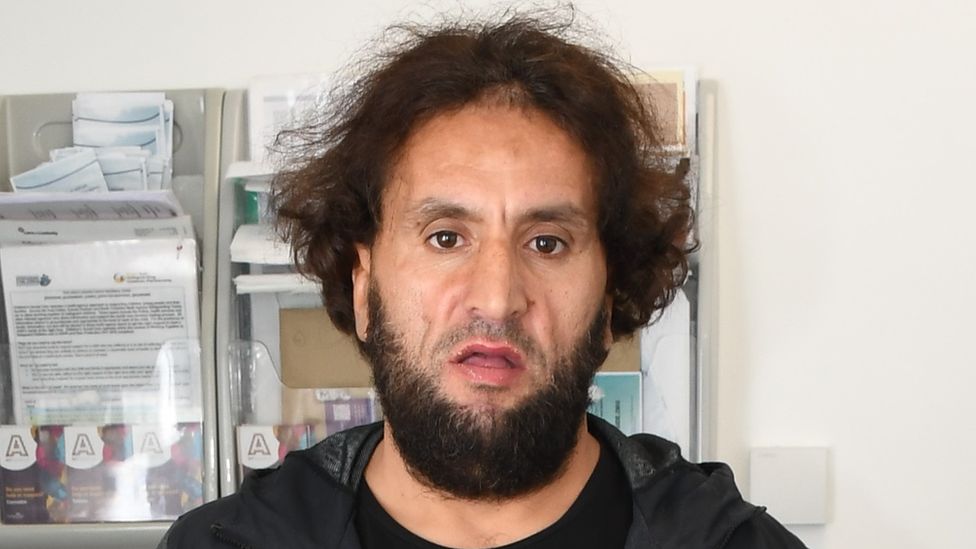Hartlepool murder-accused extremist 'did not intend to kill'
- Published

An Islamic extremist accused of murder has admitted stabbing two men but says he did not intend to kill.
Moroccan asylum seeker Ahmed Alid, 45, attacked his housemate and a man he met in the street, 70-year-old Terence Carney, in Hartlepool in October.
Mr Carney died but Mr Alid, 45, denies murder and attempted murder.
Speaking through an Arabic translator, Mr Alid told Teesside Crown Court he knew it was wrong to stab the men but was not responsible for their injuries.
The court has heard Mr Alid lived with three other men at a home for asylum seekers on Wharton Terrace in Hartlepool.
Prosecutors said he followed an "extreme interpretation of Islam" and objected to one of his Iranian housemates, Javed Nouri, converting to Christianity.
'Was it wrong?'
In the early hours of 15 October he forced his way into Mr Nouri's bedroom and stabbed him multiple times, then fled and stabbed Mr Carney who was out for an early morning walk, jurors have heard.
He told police he launched the attacks in support of Palestine and to oppose Israel and the Gaza conflict.
When asked by his barrister, John Elvidge KC, if he stabbed Mr Nouri and Mr Carney, Mr Alid replied: "Yes."
Mr Elvidge asked: "Do you agree it was wrong to stab them?"
Mr Alid, who was dressed in a black suit and dark grey shirt, replied: "Yes."
Mr Elvidge asked if he intended to kill or seriously injure either man, to which Mr Alid responded: "No."
Asked by Mr Elvidge: "Do you agree you are responsible for the injuries they suffered?" - he also responded "no".
Mr Alid told the court he was born in Morocco but lived and worked in Algeria, where he ran a "successful" coffee and pastries shop, having trained as a patisserie chef.
He said he left Algeria because he was being "harassed" by local authorities over his shop, and subsequently moved to Spain.
He also spent time in France, Italy and Greece before settling in Germany for 13 years, although he was not granted full asylum and did not have permission to work.
Mr Alid said he then spent short periods in Sweden, Norway, Finland, Switzerland and Austria, before returning to Germany in 2014 for four years, and then Spain for a further two years where he worked in a pastry shop.
He said he was not able to return to Algeria because of his earlier issues there, and as the coronavirus pandemic was "most dangerous" in Spain, he said he moved to Britain in late 2020 travelling via Paris, Brussels and Amsterdam.
He said he arrived at Teesport in Middlesbrough by ferry from Holland and entered the country illegally.
'Raise his voice'
Mr Alid told jurors he was arrested by police in Middlesbrough and applied for asylum, with his intention being to work in the UK.
He said he was housed initially in Hull and Doncaster, before being moved to Hartlepool in early 2021.
Mr Alid said he received £40 and was only allowed to work for four hours a week, and "until today" had yet to receive an answer to his asylum application.
Mr Nouri moved into the Wharton Terrace house in September 2023 but he and Mr Alid instantly had problems with one another, Mr Alid said.
"The first impression wasn't good," Mr Alid said, adding the pair had clashed over the house's cleanliness and he believed Mr Nouri "wasn't an honest person".
He said Mr Nouri, who was a bodybuilder, would "raise his voice" and "show his muscle", and sometimes blew cigarette smoke into his face.
'War in my mind'
Mr Alid said he awoke on 15 October and all his problems "came into [his] head" all at once, including issues with Mr Nouri, finding work, feeling "homesick" and worries about his parents.
He told jurors he went downstairs "quickly", as if someone was pushing him, and added: "I tried to slow myself down but I couldn't."
He said he picked up two knives form the kitchen and "forced" his way into Mr Nouri's room where he attacked him.
"Were you trying to kill Javed Nouri?" Mr Elvidge asked.
"No," replied Mr Alid.
He said he then walked into town and came across Mr Carney when "war was in [Mr Alid's] mind", a reference to the Gaza conflict.
Mr Alid said he was saying "free Palestine" in a loud voice and Mr Carney said "some words" which Mr Alid thought meant "go back to your country".
'Wasn't feeling well'
He said Mr Carney then "came towards" him and "pushed" him.
Jurors have seen CCTV footage appearing to show Mr Carney trying to run away from the encounter.
"Why did you stab him?" Mr Elvidge asked.
Mr Alid said he had "lost a lot of blood" during the melee with Mr Nouri and "wasn't feeling well", and he feared he was going to faint and Mr Carney would take the knife and stab him.
He said as Mr Carney was on the ground, he believed the pensioner was "looking for a stone to hit" him, so he left him but "didn't know he was going to die".
Mr Alid also denies assaulting two detectives at the end of his police interview.
He told jurors he had a "difference" with the Tunisian interpreter helping him and did not intend to hurt the officers.
The trial continues.
Follow BBC Tees on Facebook, X (formerly Twitter), and Instagram. Send your story ideas to northeastandcumbria@bbc.co.uk.
- Published16 April
- Published15 April
- Published12 April
- Published11 April